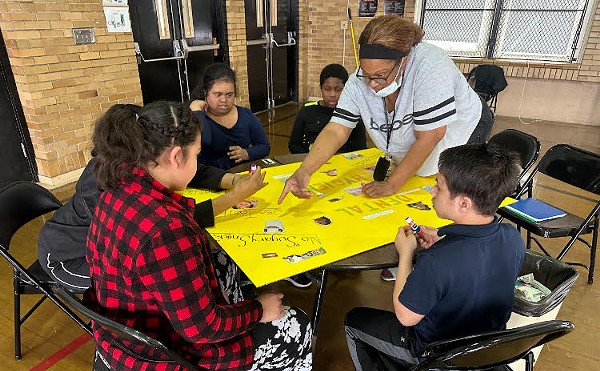A bill in the general assembly would allow for the creation of a localized Affordable Housing Trust Fund. Here’s why that’s essential.
Trish Seitz loves frogs. She can’t tell you why; she just does. Toy frogs are everywhere in her apartment — at the foot of the mantel, on the mantel; the entire bathroom is decorated in a frog motif — in various shades of green, mostly stuffed animals.
Trish is 46 years old. When she talks, she commands every available bit of attention in the room. She is gregarious, confident, self-assured and good with words. She works at the Highland Educational Center for Kids, with 2- and 4-year-olds, and says the best part of the job is the hugs. The porcelain angels in her curio cabinet complement both her dish set and her wall art, and her refrigerator is smattered with photos of her cousins.
Trish has a mild form of mental retardation that’s nearly imperceptible unless you’re watching for it. This is the first time she’s lived in her own apartment, a shotgun-style in St. Matthews that bears all outward signs of an ordinary one-bedroom. When she moved out of her parents’ place last August, she was frightened by the prospect of going it alone, and a little resentful of her parents for encouraging it.
Now, for the first time in her life, she has real friends, and is plugged into a bona fide social network, her mother Nancy says. Trish and her neighbors have dances and pizza parties, cook communal dinners, watch movies and go bowling, among other things. When one member of the group comes home from being out, she lets the others know she’s returned. Trish calls her neighbors brothers and sisters.
“I really have been happy,” she says. “Of course, it was kind of hard at first, when I moved. What I was having trouble with was the emotional part of moving out. The transition was hard at first. But then, after being here, I’ve gotten used to it. I’ve made a lot of new friends. I love it out here.”
Her four-unit building and the complexes on both sides are owned by Dreams With Wings, a Louisville-based non-profit agency that helps adults with mental retardation and other developmental disabilities by offering housing, employment opportunities and social networks like the one Trish is part of.
Like most things of this nature, the funding to buy the buildings — DWW owns 30 apartments in nine buildings — came piecemeal: a chunk from the federal government, some from the city, and $588,361 (in its five-year life) from the state’s Affordable Housing Trust Fund. It’s safe to say Trish would still occupy the second floor of her parents’ Highlands home if not for the fund.
The Kentucky Affordable Housing Trust Fund is a piggy bank that’s pushed about $3.5 million to Jefferson County since it began in 1994. Statewide, some $39 million has been spent over 11 years. It has provided grants and low-interest loans to agencies like DWW, House of Ruth, Boys Haven and 35 others in Jefferson County alone in the past 12 years.
After operating four years with a paltry $200,000 annually for a need that far outweighed that, the trust fund secured a dedicated source of revenue in 1998, when a portion of the state’s unclaimed lottery winnings began filtering into it. Until the change, the trust fund aided the creation of 760 new units for low-income Kentuckians. Between 1998 and 2003, that figure soared to 3,300.
Now, a bill in Frankfort would allow for localized Affordable Housing Trust Funds, and provide additional sources of revenue to slowly grow the state fund. HB 338 has 32 bipartisan co-sponsors, and has passed the Local Government and Appropriations and Revenue committees. If it passes a full House vote, it will undergo the same machinations in the Senate.
Housing advocates expect it to pass. Considering recent rate hikes for natural gas, plus continually sagging federal housing funds, more guaranteed money to ensure that Kentuckians in need have a place to live should come as a welcome humanitarian respite, if not a downright bureaucratic wonder.
It’s not a solution for the tens of thousands of people in Jefferson County alone who need a decent place to live, nor the funding Shangri-la that housing advocates have worked for forever. It is, however, a solid start.
‘Harmonic convergance’
Boiled down, HB 338 does two things. First, it permits counties to establish their own trust funds, and secures for them money from the state fund.
Second, it beefs up the state fund by decrying that all delinquent property taxes over $7 million — the amount Gov. Ernie Fletcher’s budget has appropriated — redirect to the state trust fund. New $10 fees will be imposed on each mortgage and property conveyance.
Cathy Hinko, executive director of the Metropolitan Housing Coalition, calls the genesis of HB 338 “harmonic convergence.” It begins with the Mayor’s “Comprehensive Housing Strategy for Louisville Metro,” released last year, which specifically calls for the creation of a Jefferson County Affordable Housing Trust Fund. MHC was put in charge of developing a plan.
Meanwhile, CLOUT (Citizens of Louisville Organized and United Together) was developing an expertise on housing issues independently.
The three parties eventually merged their efforts, and, with the help of what Hinko calls a synergistic grassroots movement of nearly 100 groups, from social justice and religious organizations to neighborhood associations, were able to draft the bill with legislators (Jim Wayne, D-Jefferson, and Charles Siler, R-Williamsburg, were the original sponsors).
Hinko notes that the discourse where housing and public policy converge has finally reached a critical point of awareness: The discussion has shifted from “why do we need this?” to “how can we pay for it?”
“We didn’t want to rob Peter to pay Paul,” Hinko says, calling the proposed legislation an “elegant program” for its attention to proportionality, both for counties and their low-income beneficiaries. She says the need for locally controlled funds is more immediate than ever.
Chad Carlton, spokesman for Mayor Abramson, says that with the Bush administration targeting federal housing initiatives like Hope VI — which partially funded Park DuValle and Clarksdale (now called Liberty Green), two of the city’s mixed income developments — initiatives like HB 338 gain further significance.
“It’s not just about putting more dollars into that on the local level. It’s about creating a leveraging approach where the public puts some in, the private sector puts some in.”
Somewhat normal lives
Under federal guidelines, you are considered “low-income” if more than 30 percent of your monthly intake goes toward rent and utilities. According to the National Low Income Housing Coalition, a person should earn $10.83 an hour to afford a two-bedroom apartment in Louisville in 2005. Examples of workers who typically don’t earn that: childcare, janitor, preschool teacher, teacher’s assistant, retail salesperson, home health aide, bank teller, emergency medical technician and paramedic. On average, cops, firefighters and nurses earn barely over that mark.
Crystal Blackburn is 26 years old, and her son Nigel is 5. They share a small two-bedroom apartment in a Ninth Street complex owned by the Metro Housing Authority. The door is heavy steel and the floors hard tile, except for her carpeted living room.
Her rent is $22 a month, utilities included.
Blackburn’s been living here eight years, and her mother and aunt live in apartments across the courtyard. She grew up here, and says she likes it OK, though she doesn’t let her son play outside without her supervision.
Blackburn was a childcare worker making $6.75 an hour and working 45 hours a week until she was laid off from the Wesley House Jan. 13. She’s recently developed a political interest in poverty issues.
Incidentally, Blackburn represents a more typical face to housing issues than Trish Seitz, although both — and thousands in between — need the assistance they receive to live somewhat normal lives as much as anything.
“I don’t want assistance,” Blackburn says defiantly. “I want to be able to work and have a job that pays me what I’m worth for what I’m doing.”





